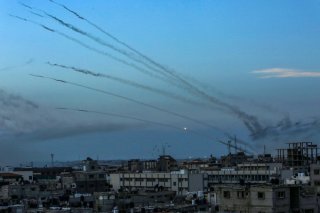The Day After in Gaza
Installing the Palestinian Authority in Gaza would inevitably lead to the re-emergence of a terror state. Any future autonomous entity in Gaza should meet conditions that ensure it will live in peace with the State of Israel and promote the prosperity of its residents.
“Security challenges make the building of a port in Gaza problematic for the foreseeable future.”
“The State of Israel has experienced the failure of international troops in Sinai (before 1967), Lebanon, Gaza, and the Golan. Given its experience, Israel’s first doctrine of security – that it must be able to defend itself by itself – is as salient as ever. It is a critical strategic interest of the United States that the State of Israel remain strong and secure, protected by the IDF, and continue to remain an anchor of stability in the region.”
Economic Conditions
An international fund should be established for infrastructure development, the cost of which is not expected to be absorbed by the State of Israel.
Capital raised through this international effort will be placed into a new fund administered by an established multilateral development bank. Accountability, transparency, anti-corruption, and conditionality safeguards will protect investments and ensure that capital is allocated efficiently and effectively.
Significant investments will require a governance structure that allows the international community to safely and comfortably put new money into investments that future conflicts will not destroy.
“The Palestinians shall have established transparent, independent, and credit-worthy financial institutions capable of engaging in international market transactions in the same manner as financial institutions of western democracies with appropriate governance to prevent corruption and ensure the proper use of such funds, and a legal system to protect investments and to address market-based commercial expectations.”
The Prospect of Peace
In the initial stage, to defeat and uproot Hamas, Israel will have no choice but to assume control of the entire Gaza Strip and set up a civilian administration, similar to how it administered Gaza from 1967 to 1994, until the Oslo Accords and transfer of power to the PA. During this period, the IDF maintained control of military affairs and oversight of civilian affairs, which were managed in conjunction with local representatives of the Arab population at the municipal level. It is important to note that during this period, there were far fewer attacks against Jewish soldiers and residents, increased economic prosperity for all of Gaza’s residents, and many examples of mutually beneficial coexistence. Following the installation of the PA in 1994, Hamas’ power grew, terror attacks increased, and institutionalized incitement undermined much of this coexistence.
Israel is, of course, not interested in undertaking a long-term military administration of Gaza. It is, however, necessary that any future autonomous entity in Gaza meet the conditions that will ensure it lives in peace and coexistence alongside Israel. Anything less will ultimately devolve again into an unacceptable and existential threat to the State of Israel.
Dr. Raphael BenLevi is a fellow at the Misgav Institute for Zionist Strategy in Jerusalem, a reserve officer in the IDF intelligence branch, and director of the Churchill Program for National Security of Tikvah-Fund Israel.
Image: Shutterstock.com.

